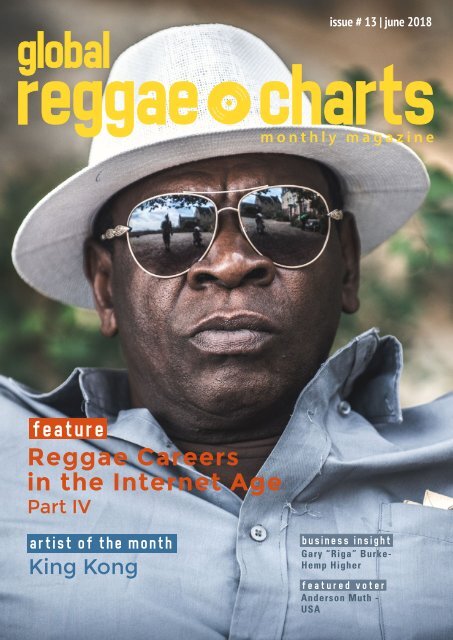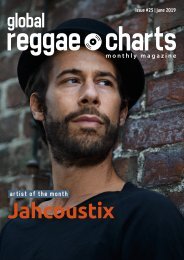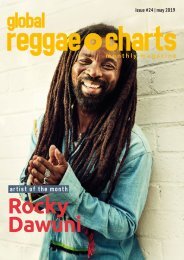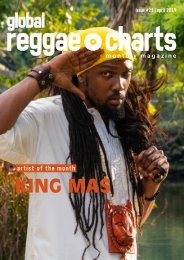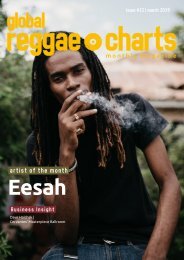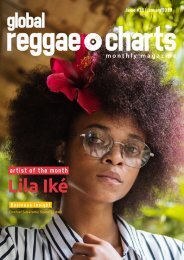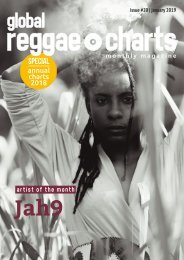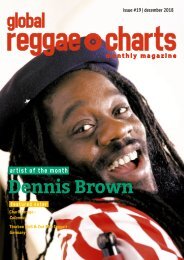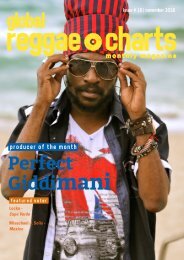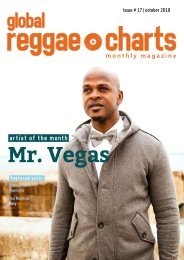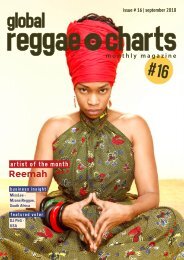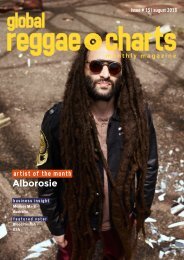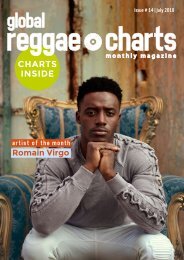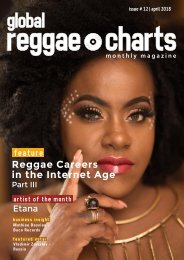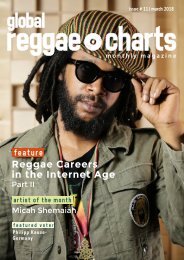Global Reggae Charts - Issue #13 / June 2018
Inside you can find the latest reggae album, single, and riddim charts based on votes by radio DJs and music directors from around the world.
Inside you can find the latest reggae album, single, and riddim charts based on votes by radio DJs and music directors from around the world.
Create successful ePaper yourself
Turn your PDF publications into a flip-book with our unique Google optimized e-Paper software.
issue # 13 | june <strong>2018</strong><br />
feature<br />
<strong>Reggae</strong> Careers<br />
in the Internet Age<br />
Part IV<br />
artist of the month<br />
King Kong<br />
business insight<br />
Gary “Riga” Burke-<br />
Hemp Higher<br />
Anderson Muth -<br />
USA<br />
global reggae charts | issue 13 / june <strong>2018</strong>
global reggae charts | issue 4 / august 2017<br />
<strong>#13</strong>
editorial<br />
Welcome to a new edition of the <strong>Global</strong> <strong>Reggae</strong> <strong>Charts</strong>!<br />
In 1968 Toots & The Maytals sang “Do The Reggay”, thereby creating one of the first public documents<br />
that used the word reggae. In the 50 years since then, reggae music has traveled from the<br />
small island of Jamaica around the globe and found fans and lovers basically everywhere it has<br />
gone. Today, you can find reggae communities from Thailand to Brazil, from Ivory Coast to Sweden.<br />
<strong>Reggae</strong> in <strong>2018</strong> is a global affair.<br />
One year ago, we set out to provide the international reggae community with a useful tool: charts<br />
that represent reggae as the global phenomenon it is. This month, we celebrate the GRC’s first<br />
birthday. In our first year, we gathered a voter base that spans all continents, built the background<br />
infrastructure to make the charts work, fine-tuned the magazines concept, and much more. Still: we<br />
are far from where we want to be. Expect further improvements throughout the year!<br />
Our birthday edition comes packed. Besides the charts themselves, you will find an interview with<br />
Gary “Riga” Burke of Hemp Higher Productions about the current state of artist management. Riga<br />
managed renowned acts like Randy Valentine and Cali P, and he had interesting things to say.<br />
Moreover, we examined the DIY trend and compared it to the traditional label model in this<br />
month’s installment of <strong>Reggae</strong> Careers on the Internet.<br />
Last but not least an operational remark: with this edition, we changed the monthly label of the<br />
<strong>Global</strong> <strong>Reggae</strong> <strong>Charts</strong>, due to feedback from several of the radio hosts we are talking to. The charts<br />
are released in the midst of each month. Instead of carrying that month in the title, they are now<br />
named after the upcoming one, meaning this edition is the <strong>June</strong> edition. By doing so the charts<br />
feel more current and have a longer half-life, allowing our media partners to feature them more<br />
conveniently. The issue count is not impacted by that change.<br />
Cheers,<br />
Thomas<br />
Thomas Euler is founder of the German reggae & dancehall blogazine whagwaan-magazine.de<br />
1<br />
global reggae charts | issue 13 / june <strong>2018</strong>
Album single <strong>Charts</strong> | top 20<br />
Period<br />
Ending 30/04/<strong>2018</strong><br />
Contributing voters: 50<br />
# LM 2M PK Mo Artist Single Label<br />
↑ 1 20 - 1 2 Raging Fyah Rebel Dub Rockers<br />
+ 2 - - 2 1 Jah9 Love Has Found I VP<br />
3 3 10 3 3 Protoje Bout Noon Mr Bongo<br />
4 1 1 1 3 Capleton Help the Weak feat. Chronixx ZincFence<br />
↑ 5 14 - 5 2 Bryan Art Can‘t Cut Wi Vibes G-Block<br />
6 2 2 2 4 Koffee Raggamuffin Frankie Music<br />
7 4 12 4 3 Dre Island Yaad N Abraad Digi Killaz<br />
8 6 13 6 3 King Kong Old School feat. Burro Banton, Pinchers Irie Ites Records<br />
+ 9 - - 9 1 Samory I Call on Jah Evidence<br />
10 7 7 2 6 Jah9 Feel Good VP<br />
11 8 9 8 3 Micah Shemaiah Roots I Vision Evidence<br />
+ 12 - - 12 1 Kabaka Pyramid Kaught Up Ghetto Youths International<br />
13 12 17 11 7 New Kingston Come from Far Easy Star<br />
↑14 19 - 14 2 Marla Brown Trigger Marla Brown<br />
↑15 - 4 4 2 Kabaka Pyramid Borders feat. Stonebwoy Ghetto Youths International<br />
+ 16 - - 16 1 Freddie McGregor Go Freddie Go Big Ship<br />
↑17 18 - 17 2 Mellow Mood Large La Tempesta Dub<br />
18 17 20 17 3 Tarrus Riley Haunted Diwali<br />
↑19 - 14 14 2 Sting & Shaggy Don‘t Make Me Wait A&M<br />
+ 20 - - 20 1 Cocoa Tea Medical Marijuana Walshy Fire<br />
Bryan Art Samory I Mellow Mood<br />
Sting & Shaggy Jah9<br />
# = this month’s position on the chart LM = last month’s position on the chart 2M = position two months ago<br />
PK = peak position MO = months on the chart ↑= signifies upward movement + = new entry<br />
global reggae charts | issue 13 / june <strong>2018</strong> 2
Album <strong>Charts</strong> | top 20<br />
Period<br />
Ending 30/04/<strong>2018</strong><br />
Contributing voters: 43<br />
europe<br />
# LM 2M PK Mo Artist Album Label<br />
↑ 1 4 12 1 3 King Kong Repatriation Irie Ites Records<br />
↑ 2 3 - 2 2 Etana <strong>Reggae</strong> Forever Tad‘s.<br />
+ 3 - - 3 1 Romain Virgo Lovesick VP<br />
4 1 2 1 3 Micah Shemaiah Roots I Vision Evidence<br />
5 2 1 1 4 Sly & Robbie and Dubmatix Overdubbed Echo Beach<br />
6 11 - 6 2 Bushman Conquering Lion Burning Bushes<br />
+ 7 - - 7 1 Mellow Mood Large La Tempesta Dub<br />
8 5 3 1 7 Jesse Royal Lily of da Valley Easy Star<br />
+ 9 - - 9 1 Alpheus Light Of Day Liquidator<br />
10 6 6 6 4 Hollie Cook Vessel of Love Merge<br />
11 8 8 2 6 Havana meets Kingston Havana meets Kingston Baco<br />
+ 12 - - 12 1 Shaggy 44/876 feat. Sting A&M<br />
+ 13 - - 13 1 Joe Pilgrim & The Ligerians Step Out Soul Nurse<br />
14 7 4 2 10 Damian Marley Stony Hill Republic<br />
15 10 11 10 4 Iba Mahr Get Up and Show Oneness<br />
↑16 - 18 12 4 Alborosie Soul Pirate - Acoustic Geejam<br />
+ 17 - - 17 1 I-Octane Love & Life Conquer The Globe<br />
18 15 - 15 2 Vibronics Woman on a Mission SCOOPS<br />
+ 19 - - 19 1 Moja One Association Art Beat<br />
+ 20 - - 20 1 Javada Feel Brand New Irievibrations<br />
Alpheus<br />
King Kong<br />
Etana<br />
Romain Virgo<br />
I-Octane<br />
# = this month’s position on the chart LM = last month’s position on the chart 2M = position two months ago<br />
PK = peak position MO = months on the chart ↑= signifies upward movement + = new entry<br />
3<br />
global reggae charts | issue 13 / june <strong>2018</strong>
<strong>Reggae</strong> Careers<br />
in the Internet Age<br />
Part IV: Do-it-yourself vs. Labels:<br />
How Artists Structure Their Business in <strong>2018</strong><br />
Text: Thomas Euler // whagwaan-magazine.de<br />
These days, there is a lot of talk about DIY (do-ityourself)<br />
artists among music industry people. The<br />
term refers to artists who forgo the traditional model<br />
of signing with a music label and instead opt to take<br />
their business into their own hands. By leveraging<br />
the possibilities that the internet has created, DIY<br />
artists take care of everything from production to<br />
marketing and distribution; in most cases not entirely<br />
on their own, but with a small, dedicated team – all<br />
without giving away the rights to their music. While<br />
labels can certainly still provide value to artists, the<br />
DIY path is becoming a viable alternative.<br />
had to be on the shelves of retailers across the globe.<br />
This presented a logistical challenge – one that no<br />
individual artist could realistically have managed to<br />
overcome. Record labels (the majors in particular)<br />
filled that void by building the required infrastructure<br />
for distribution and relationships to retailers. The<br />
labels basically owned distribution (and therefore<br />
could dictate terms to artists, e.g. demanding to own<br />
the rights to the music). It was almost impossible to<br />
get in front of a sizable audience without their support.<br />
As a result, artists had little bargaining power in<br />
the world of physical distribution.<br />
Artists that have gone a long way in this fashion<br />
include: Lil Yachty, Chance the Rapper (who turned<br />
down $10mil offers to stay indie) or Major Lazer. And,<br />
just as importantly, some artists who formerly had<br />
label deals decided to go independent as well. Frank<br />
Ocean famously played a trick on Def Jam/<br />
Universal: while still being contractually obliged to<br />
deliver a new album, he released an obscure visual<br />
album on Def Jam, only to release his proper album<br />
Blond the next day — on his own label Boys Don’t<br />
Cry.<br />
In order to understand why DIY is increasingly<br />
popular among artists, it is necessary to understand<br />
the underlying changes in the music business world<br />
that laid the foundation from which the trend could<br />
emerge. The simple answer of course is the internet.<br />
But let’s dig a little deeper.<br />
- From distribution to discovery -<br />
Before the internet and the advent of digital distribution<br />
– at first selling files and nowadays streaming<br />
– music was sold on physical records. To get it in the<br />
hands of as many people as possible, the records<br />
That, however, is no longer the case. Distributing<br />
digital music takes only a few clicks. While there<br />
are several distribution tools, DistroKid is likely the<br />
gold-standard. For $20 a year, artists can get their<br />
music to all the relevant services from Spotify to Apple<br />
Music, from YouTube to iTunes. Thus, distribution<br />
is no longer the key challenge in the music market.<br />
The bigger challenge today is building an audience.<br />
As music (like all other content) is now only a click<br />
away, fans nowadays have access to a practically unlimited<br />
amount of music. The critically scarce resource<br />
is no longer shelve space but attention. A good<br />
product is certainly a key ingredient to accumulate<br />
the latter. However, and I suppose much to the dismay<br />
of many artists, it isn’t enough. Instead, it takes<br />
active marketing efforts to make sure people actually<br />
find the music. To put it in a bit more technical terms:<br />
the internet has reduced distribution costs to (essentially)<br />
zero; today’s challenge is discovery (from<br />
the user’s perspective) or attracting users (from the<br />
artist’s perspective).<br />
- Many jobs, different models -<br />
At the same time, the internet is also an important<br />
global reggae charts | issue 13 / june <strong>2018</strong><br />
4
global reggae charts<br />
feature<br />
tool for every artist trying to build an audience.<br />
While doing so is certainly a lot of work, it doesn’t<br />
require nearly the same huge financial investments<br />
as in the world of mass media. With the investment<br />
of time and effort, artists can go a long way. Using<br />
social media and reaching out to specific communities-of-interest<br />
(e.g. reggae, dancehall, rap) can move<br />
the needle visibly.<br />
The catch here, of course, is that no artist can do it<br />
truly independently (as in: alone), for the limiting factor<br />
is time. Here are some of the jobs that a DIY artist<br />
needs to take care of:<br />
• booking & tour management<br />
• marketing, PR, radio & TV promotion<br />
• video production<br />
• ticket sales<br />
• merchandising<br />
• brand partnerships<br />
• retail distribution (if applicable)<br />
Even though digital tools have made all of these simpler,<br />
it’s too much for any one person to handle. Yet,<br />
it no longer takes a traditional label to get them done<br />
either. There is a whole heap of specialized service<br />
providers that get the jobs done, and most successful<br />
DIY artist have assembled a capable team – a.k.a.<br />
an entourage – around them that manages many of<br />
the tasks.<br />
As a result, artists structure their business and<br />
contracts in many different forms today. There is no<br />
longer a norm. Instead, you’ll find all kinds of setups<br />
ranging from 360 deals with major labels — where<br />
the label basically takes care of everything and gets<br />
a cut of all revenue streams, including live performances<br />
— to complicated structures where a label<br />
might be involved but only as a service provider.<br />
For instance, it might handle distribution or marketing<br />
but only license (not own) the masters. In other<br />
cases, no traditional label (as in: it owns the rights to<br />
music) might be involved because the artist works<br />
with several specialized vendors.<br />
The key takeaway here is: alternatives to labels<br />
exist. That’s significant (and should possibly frighten<br />
the labels). Because it means artists have a choice.<br />
Labels suddenly have to compete with a new class of<br />
competitors that handle jobs that would have traditionally<br />
been firmly in the labels’ hands.<br />
A key difference between the traditional label model<br />
and the new service providers is the terms offered to<br />
artists – importantly also including the rights. Labels<br />
traditionally held the rights to the music of the artists<br />
they signed; many of their new competitors don’t.<br />
For a business-minded musician, that can clearly<br />
be a big factor: owning your own rights not only<br />
assures maximum earning potential from royalties<br />
but also allows you to control (and benefit from) all<br />
additional revenue streams as for instance licensing.<br />
Therefore, it’s not surprising that more and more<br />
artists don’t feel attracted by the label model and try<br />
the DIY path instead.<br />
- Why labels still matter -<br />
But even though DIY is a significant trend, it would<br />
certainly be premature to prepare a eulogy for the<br />
labels. Not only are their services still relied upon by<br />
many artists, they moreover still have cultural significance.<br />
While researching this piece I talked to Falk<br />
Schacht, one of Germany’s best-known rap journalists<br />
and a music industry insider for 20+ years. He<br />
reminded me that many artists still regard being<br />
signed to a renowned label as a signal of prestige.<br />
Plus, there are still tangible advantages for artists.<br />
The first one: security. When artists sign a contract,<br />
the label pays them an advance. While going DIY is<br />
essentially the entrepreneurial approach to a music<br />
career, signing with labels is likely the preferred option<br />
for artists who want to avoid the risk that comes<br />
with betting big on oneself. Moreover, labels provide<br />
the one-stop shop solution to all the jobs I listed<br />
above. That’s quite convenient (at least in theory),<br />
as aspiring artists can focus on their music without<br />
having to assemble – and manage – an entire team<br />
of collaborators.<br />
However, the main argument which industry insiders<br />
5<br />
global reggae charts | issue 13 / june <strong>2018</strong>
global reggae charts<br />
repeatedly bring up when asked about the value that<br />
major (or established indie) labels provide to artists<br />
are their relationships to radio. Matt Colon, co-founder<br />
of Deckstar Management, said in a read-worthy<br />
exploration of the question (emphasize mine):<br />
The internet and social media have leveled the<br />
playing field enormously, so for most of my artists I<br />
only advise that we look to major labels if their music<br />
immediately lends itself to radio, i.e. pop-leaning.<br />
All that said, radio is still the key way to truly have a<br />
record go from a great song to a hit song, and major<br />
labels work radio better than anyone else.<br />
Radio is still the dominant way people discover<br />
music. Streaming and its playlist-based approach to<br />
discovery is certainly catching up and even has created<br />
several proper hits on its own. Yet, radio is still a<br />
highly relevant channel in many demographics and<br />
the place many people rely on for discovering new<br />
music. As long as radio remains critical for success,<br />
established labels have an important asset for artists<br />
targeting the mainstream.<br />
In a niche genre like reggae, attention and relevance<br />
is accumulated on different paths. Since mainstream<br />
radio mostly ignores it, the dedicated channels<br />
for the scene – e.g. reggae websites, reggae radio<br />
programs, sound systems – are much more relevant<br />
to most artists. That’s not the major labels’ turf. On a<br />
smaller scale, though, the same dynamic as outlined<br />
above exists: established actors – including but not<br />
limited to reggae labels – possess a valuable network<br />
and have access to the right people. That can be<br />
invaluable to an artist. But since the genre is small<br />
and the scene rather connected, it often doesn’t take<br />
a label deal to work with them: alternative arrangements,<br />
as outlined above, are commonplace.<br />
- The takeaway -<br />
Artists in <strong>2018</strong> can choose from various options when<br />
deciding how they want to structure their business.<br />
Signing with a label is an option, but definitely not<br />
the only feasible one. Which choice is the correct one<br />
is highly dependent on the respective situation and<br />
to individual preferences, for instance when it comes<br />
to one’s affinity for taking risks. Giving a default onesize-fits-all<br />
answer is therefore impossible. But advice<br />
that applies to literally every artist is: know your<br />
options! Many aspiring artists are young adults and<br />
mainly focused on their music (understandably so!).<br />
The business-side often isn’t their top priority. That,<br />
though, is likely a mistake. Finding the right model to<br />
work in might take some time but it can also make a<br />
big difference when it comes to building a sustainable<br />
career.<br />
If you have any feedback or input in the meantime,<br />
just drop me a line at thomas.euler@whagwaan-magazine.de<br />
Album Riddim <strong>Charts</strong> | top 5<br />
Period<br />
Ending 30/04/<strong>2018</strong><br />
Contributing voters: 28<br />
europe<br />
# LM 2M PK Mo Label Riddim<br />
↑1 2 5 1 3 Digi Killaz Yaad N Abraad Riddim<br />
↑2 5 - 2 2 Giddimani Anti-Racism Riddim<br />
+ 3 - - 3 1 Walshy Fire Top Shelf Riddim<br />
+ 4 - - 4 1 Massive B Rudeboy Skank Riddim<br />
+ 5 - - 5 1 Ambassador Musik Mighty Roots Riddm<br />
Rudeboy Skank Riddim<br />
Top Shelf Riddim<br />
global reggae charts | issue 13 / june <strong>2018</strong><br />
6
global reggae charts | issue 13 / june <strong>2018</strong>
BUSINESS<br />
INSIGHT<br />
global reggae charts<br />
insight<br />
INTERVIEW<br />
Some insights on the reggae business and artist<br />
management coming this month from Gary “Riga”<br />
Burke, who managed artists like Randy Valentine and<br />
Cali P and helped them to establish their careers.<br />
Felix Rühling: Hi Riga. You are a busy man, and for<br />
many years you have worked behind the scenes within<br />
reggae. You work as a label, producer, and booker,<br />
but maybe the biggest impact you have had on the<br />
reggae scene so far was as the manager of Randy<br />
Valentine and Cali P. This aspect of your work will be<br />
the focus of this reasoning, but before we start to<br />
talk about how the magic is done, maybe you can<br />
give a little insight into your background and what<br />
you are doing.<br />
Gary “Riga” Burke: Hi Felix. Wow, insight into my<br />
background… I’ve been traveling a lot over the past<br />
20 years so it’s hard to keep that short (laughs).<br />
I’m 35 years old, my parents are Irish - but I grew up<br />
in Switzerland before moving to London and then<br />
back to Europe. I’ve been recording, producing, and<br />
working with reggae and dancehall artists for 17<br />
years now - mostly in Europe and the Caribbean, and<br />
I’m currently working between Barcelona (where our<br />
booking agency is based) and Geneva (where my<br />
studio is based - it’s great because it’s only like 30<br />
Euros with easyJet and 1 hour on the plane to fly<br />
from one place to the next).<br />
Basically, I started off in 1998 as a 16-year-old DJ, we<br />
had a sound called Hemp Higher Crew and used to<br />
mix in parties in Geneva and Lausanne - I mixed in<br />
clubs before I was legally allowed to go in (laughs).<br />
We released a bunch of mixtapes, which did quite<br />
well back then between 2001 and 2006, and the<br />
concept was then even developed into a party brand<br />
in Hamburg by Kingsley Addo (with whom I used to<br />
work within the street markets in London, I was hustling<br />
CDs in the market and he was hustling clothes<br />
- so we started hustling together).<br />
My DJ career was short-lived, as I wanted to participate<br />
more in the actual creation of the music (production<br />
& engineering). I moved to London in 2001<br />
to study Audio Engineering and went on to work for<br />
several labels (EMI & Virgin Records) in the finance<br />
and marketing departments as a junior assistant.<br />
While in London, I developed my network in the reggae<br />
business by organizing dubplate sessions with<br />
Jamaican artists (recording artists such as Buju Banton,<br />
Capleton, Alton Ellis, General Levy and more).<br />
At the same time, I started producing and got signed<br />
to a Swiss company that placed some of my instrumentals<br />
on major projects in Germany and France<br />
(Sony BMG, Warner): at that time I was producing<br />
hip-hop (the first major track I produced was a single<br />
for the German rapper Massiv in 2006 - “Einer aus<br />
dem Volk”).<br />
In 2007, I moved back to Switzerland where I met<br />
Cali P. He gave me the strength and motivation to<br />
start my own label Hemp Higher Productions in 2010.<br />
We released several riddims featuring Jamaican<br />
artists (T.O.K, Bugle, Serani, Masicka, Jahmiel, etc.),<br />
before realizing that a label would only survive if it<br />
was also managing the artist. I started then to focus<br />
on Cali P’s career and we ended up joining forces<br />
with seven-time X Games gold medalist and freeski<br />
legend Tanner Hall, who allowed us to set up a base<br />
in Jamaica for Cali P to start pushing his music in the<br />
Caribbean. At the same time I met Randy Valentine<br />
(I remember his talent blew me away the first time<br />
I heard him), and I felt I could quite easily use the<br />
network I had built with Cali P to introduce Randy,<br />
so working together with my UK business partner<br />
Kevin “Blemish” Ababio we went real hard as a trio<br />
(it’s all about the teamwork) and managed to develop<br />
Randy’s career on an international level.<br />
I spent the next five years (2012-2017) focusing<br />
exclusively on artist and label management. I really<br />
enjoyed working on both Cali P’s and Randy’s careers<br />
global reggae charts | issue 13 / june <strong>2018</strong><br />
8
global reggae charts<br />
insight<br />
as I am personally a fan of both artists, so it was<br />
also a privilege for me to be able to contribute in<br />
that way. On the label side, we had six number-one<br />
reggae albums on the charts and released a number<br />
of projects: from 2010 to <strong>2018</strong> we released 230 songs<br />
from various artists - it’s been a fun ride.<br />
On the production side, I’ve been building a few<br />
riddims on the side for DJs like Walshy Fire (Major<br />
Lazer) and Vincz Lee (Switzerland’s top urban music<br />
DJ), and I have a few singles which have been<br />
sleeping on the side as I’ve been really busy and<br />
want to set up proper strategies for each release -<br />
but am getting ready to drop some new songs soon.<br />
unnoticed. So the first challenge is establishing the<br />
core fan base, which will help support the songs and<br />
the movement and give it its “own life.”<br />
Creating a network: this is something that unfortunately<br />
cannot be done overnight and is to a certain<br />
extent a reflection of your curriculum vitae.<br />
Basically, your personal network will be a sum of all<br />
the human interactions you’ve had over your life.<br />
Coming from Europe, one of the hardest parts was<br />
For <strong>2018</strong> my main focus is expanding the booking<br />
network. At the end of last year, we merged companies<br />
with the agency we were working with (Rhythm<br />
and Flow) and we decided that we were ready to step<br />
up the game to set up a larger company with bigger<br />
resources, focusing on developing the reggae and<br />
dancehall scene in Europe. We have set up offices<br />
in Barcelona and have made the team a bit bigger;<br />
we are currently five people working in the company<br />
in an effort to bring as many show opportunities as<br />
possible to our various clients.<br />
FR: You have been involved with the careers of<br />
Randy Valentine and Cali P from the very early days.<br />
When you look back at it - what do you see as the<br />
major challenges to establish a new, unknown artist<br />
in the reggae market?<br />
GB: From my point of view, there are several<br />
challenges:<br />
Establishing a core fan base: the beginning will<br />
always be the slowest part as generally the artist is<br />
still searching for their artistic direction, and has no<br />
pulling power… so at first, the exposure has to be<br />
CREATED through sweat and tears. As there is no<br />
demand at first, the main challenge is to get the music<br />
noticed “out there.” It can be the best song in the<br />
world, but if it isn’t brought to the right people and<br />
pushed the right way, a potential hit can go perfectly<br />
creating a network and getting my artists noticed in<br />
the US and the Caribbean. That took a lot of unanswered<br />
emails and phone calls before I managed to<br />
get stuff moving on other continents. However, in<br />
a place like Switzerland, it was very easy for me as<br />
I grew up there and have been working alongside<br />
most players in the industry over the past 15 years.<br />
So, creating a business network is definitely one of<br />
the big challenges as it can take years before having<br />
the type of network that would allow you to establish<br />
a new and unknown reggae artist. It’s hours of waiting<br />
at concerts backstage to meet a specific promoter,<br />
or at a radio building in order to meet the right<br />
9<br />
global reggae charts | issue 13 / june <strong>2018</strong>
global reggae charts<br />
insight<br />
people who are influencers and can facilitate the<br />
exposure of unknown artists. For example, if David<br />
Rodigan or Rory Stone Love introduces a new artist,<br />
it will have a whole different impact than if it’s by a<br />
random unknown DJ… do you see what I mean?<br />
Consistency: it isn’t that hard to get a “hot song”<br />
nowadays, however, the challenge lies in consistency.<br />
For a young artist, it is very important to keep on<br />
coming with new material, new songs, new videos,<br />
new material for their fans. Because the same way<br />
you can buss and get a hype, you can also lose that<br />
hype… so the key word is consistency. I’m not saying<br />
to put out as many songs as possible since consistency<br />
is in the standard of your product, the quality<br />
of the mixing, the quality of the videos, and the PR<br />
campaigns behind the songs. If your standards are<br />
not consistent, you will not be able to grow as an<br />
artist.<br />
Motivation: this life isn’t for everyone - you cannot<br />
be in it for the money because there isn’t much in<br />
the reggae market so you lost already if that is your<br />
main goal (laughs). You got to be in it for the passion.<br />
However, you have to stay realistic and in order<br />
to maximize the potential of the artist‘s talent, you<br />
need to generate money to push harder and to grow,<br />
and unfortunately making and marketing music is<br />
not free (so it’s a bit of a catch-22 situation… you<br />
don’t want to be in the music for the money, but you<br />
need the money to push the music). In order to make<br />
it work, you have to work 24/7 with no days off, and<br />
that can often create pressure and tensions within<br />
the team. So, the secret is all about trying to keep a<br />
healthy balance and motivate each other to go<br />
harder and push higher, the aim is to do as best<br />
as you can and move forward: try, fail, learn from<br />
mistakes, try again, fail again, learn from the new<br />
mistakes, try again so forth until eventually you will<br />
succeed; it’s as simple as that - and try to stay positive<br />
while you are at it.<br />
FR: I totally agree with your points. Maybe we<br />
can get a little deeper in some of the aspects. Let’s<br />
imagine a young artist with no experience but a lot<br />
of talent, who has recorded a professional album<br />
and now wishes to conquer the world. They are<br />
willing to work hard, but still, there are too many<br />
things to try and invest time in. And if you say you<br />
have to work 24/7, I’m sure you are aware, that 24/7<br />
is never enough time to do everything you want to<br />
do (laughs). Where would you recommend them to<br />
start? Should they try to expand their reach from<br />
their home base step by step, or should they try the<br />
whole world and see what happens? Should they<br />
start with pushing the record or should they start by<br />
playing live shows?<br />
GB: The easiest way to be taken seriously and to<br />
grow your career from the get-go is to be introduced<br />
by someone who is already established in the genre.<br />
So I guess the first thing you got to do is go out there<br />
and meet people. Your music won’t go anywhere by<br />
sitting in a room - get a core team of people together<br />
who are just as enthusiastic about your talent and<br />
your music as you are.<br />
I don’t think you can decide beforehand who or<br />
where people are going to like your music, so you<br />
have to find them wherever they are - they will be<br />
your core fan base. If you realize that it’s more local<br />
people who live your stuff and who relate to it, that’s<br />
where you got to focus - if you realize that you are<br />
mostly getting love from overseas, that is where you<br />
should put your focus. Basically, put your focus<br />
where your music can grow naturally.<br />
When you ask should you start pushing a record or<br />
doing live shows, again I would suggest to go with<br />
what the artist is more comfortable with - if they feel<br />
like they are more of a studio artist/vocalist, then focus<br />
on pushing the records, if they feel they are more<br />
of an entertainer - focus on the live shows… you also<br />
should be doing both at the same time as they go<br />
hand in hand (the records help you get more shows,<br />
the shows help promote the records).<br />
FR: You are talking about networks and I agree that<br />
it is a major task to establish a good network. Still,<br />
9global reggae charts | issue 13 / june <strong>2018</strong><br />
10
global reggae charts<br />
insight<br />
Hemp Higher productions<br />
Founded: 2010 (Merged with Rhythm and Flow in 2017)<br />
Location: Nyon / Switzerland & Barcelona / Spain<br />
Artist Management: Cali P, Randy Valentine<br />
Production Credits: Masicka, Popcaan, Jahmiel,<br />
Sizzla, T.O.K, Ward 21, Serani, Bugle, ...<br />
Artist Bookings: Stonebwoy, Cali P, Jahmiel, Masicka,<br />
Stylo G, Bugle, Marcia Griffiths, Millions Stylez, ...<br />
www.rhythmandflow.org<br />
www.hemphigher.com<br />
the internet and social media give you a lot of options<br />
to establish such a network on your own today.<br />
Are there any platforms you found especially helpful?<br />
GB: Real life I found was the best platform.<br />
Most of the links I have and the people who actually<br />
helped me are people I met and vibed with in real<br />
life. Social networks are great to get in touch and to<br />
contact people, but they don’t allow you to build real<br />
relationships with people - those you get by traveling<br />
and going on the road and meeting people in real<br />
life.<br />
Besides the digital networks, are there any persons<br />
or companies who have been the key for you to<br />
reach “the next step?”<br />
Every single person I have worked with has helped<br />
me along the way to grow and learn. I think new<br />
steps were reached by certain ideas we implemented<br />
or projects we released. Basically, you need to<br />
count on yourself to reach the next step, not on other<br />
people.<br />
FR: Your last point is motivation. Over the past years,<br />
I have seen many artists struggling with a kind<br />
of burnout. They are pushing day and night, often<br />
times all on their own with no team, and feeling that<br />
they are really getting nothing back for their work.<br />
Even if everyone else is under the impression that<br />
their career is just doing great, there is always the<br />
feeling of a discrepancy between the energy you put<br />
in and the energy you get out. Do you think there is<br />
a certain point in a career where this changes?<br />
GB: Definitely, if you manage to get through that<br />
initial “frustration” stage that every artist goes<br />
through at one point or another in their career, you<br />
will be able to appreciate what you have and built:<br />
a healthy career. The only artists who actually have<br />
careers live off longevity.<br />
I put the blame on other people, not on the artists<br />
themselves; it will be the artist’s entourage who<br />
will generally gas up the artist into believing that<br />
they deserve to be bigger than what they are, creating<br />
that frustration… instead of allowing artists<br />
to appreciate what they have… fans and an artist’s<br />
entourage will often make them focus on what they<br />
don’t have… that would mess up anyone’s mind and<br />
create a sense of frustration.<br />
FR: Most of the points made so far can be true for<br />
any genre. What do you see as the specific benefits<br />
and challenges for reggae artists?<br />
GB: I would say that in the digital age a lot of the<br />
challenges are the same globally. It’s generally very<br />
hard to get noticed, as so many new artists are arriving<br />
on the scene every day that people pay less and<br />
less attention and it’s harder to build a loyal following<br />
than 20 years ago.<br />
When it comes specifically to reggae, one of the<br />
good sides is that the music is global; the downside<br />
would be it’s very small “niches” of people globally,<br />
meaning that although reggae has influenced just<br />
about every other genre and continues to do so, it is<br />
still referred to in most places worldwide as “underground”<br />
music.<br />
I hope I will see that change one day… and feel that<br />
people like Damian Marley, Chronixx, and others are<br />
doing that, and helping the genre open itself to a<br />
broader audience.<br />
FR: Thank you so much for your time, and all the<br />
best for your future projects!<br />
11<br />
global reggae charts | issue 13 / june <strong>2018</strong>
KING KONG<br />
Dennis Thomas a.k.a. King Kong is an iconic 1980s Jamaican artist just like<br />
Tenor Saw and Nitty Gritty. He began his career in 1982 and was working with<br />
producers like King Tubby, King Jammy, Black Scorpio, Bunny Lee, Prince<br />
Jazzbo, and many others. <strong>2018</strong> marks a revival for this artist who released his<br />
12th album entitled “Repatriation” on the label Irie Ites Records. This album<br />
hit the top of the album charts this month and so we considered<br />
King Kong more than worthy for a front page feature.<br />
global reggae charts | issue 13 / june <strong>2018</strong>
global reggae charts | issue 13 / june <strong>2018</strong>
COMMUNITY<br />
RADIO<br />
USA<br />
global reggae charts<br />
featured voter<br />
INTERVIEW<br />
This month we talked to Anderson Muth a.k.a. The<br />
Groove Thief, who presents the shows Dub Palace and<br />
<strong>Reggae</strong> Transfusion on the community radio station<br />
KGNU out of Boulder (CO), USA, and is also the editor<br />
of this magazine.<br />
Photo: Evan Semone<br />
<strong>Global</strong> <strong>Reggae</strong> <strong>Charts</strong>: Hi Anderson. Please give<br />
us some information about yourself and your radio<br />
show.<br />
Anderson Muth: Certainly! Primarily as The Groove<br />
Thief, I’ve been promoting, selecting, and writing<br />
about reggae and its numerous related sounds since<br />
2011. Until 2016 I was based out of Hong Kong, China,<br />
and now I’m here in Denver, Colorado. To keep a<br />
long story short, it was quite hard leaving a music<br />
scene I’d enjoyed so much time in, so my friends<br />
Tree-Angles and I began our Pomegranate Sounds<br />
record label last year as a way to keep the vibes<br />
alive from our somewhat infamous and eclectic club<br />
night Pomegranate. I also run a small mobile sound<br />
system, called Pomegranate Hi Fi, which is a lot of<br />
challenging fun, and work in studio with my production<br />
partner Scotty McD.<br />
I host the Dub Palace and <strong>Reggae</strong> Transfusion shows<br />
on KGNU Community Radio each month. The station<br />
is based out of Boulder, but has a Denver studio as<br />
well. Dub Palace is all about dubwise sounds, including<br />
dubstep and future dub; <strong>Reggae</strong> Transfusion is<br />
exactly that, so I try and feature a mixture of digital<br />
and roots music. Dub Palace is also live-broadcasted<br />
from a bar once a month, so playing those sessions<br />
is particularly enjoyable. I always play a lot of new<br />
music and usually feature local Colorado artists as<br />
well as other eclectic international releases beyond<br />
the more expected selections.<br />
GRC: Apart from the radio show, you are also writing<br />
about reggae. What is your motivation?<br />
Anderson with his dog Joey<br />
AM: I’ve always loved music and writing, and have<br />
been an English as a Second Language (ESL) teacher<br />
for many years now. I used to fancy myself a travel<br />
writer, and have written for a city government as<br />
well as larger brands like Time Out Hong Kong magazine.<br />
But writing about a music I love is the most<br />
enjoyable. There’s so much to listen to, and so much<br />
content in general out now, yet too much so-called<br />
music journalism is just regurgitated press releases;<br />
I take pride in digging deeper with an artist for an<br />
interview, or into their work for an in-depth review.<br />
GRC: You are also an editor for this magazine. Why<br />
do you think the <strong>Global</strong> <strong>Reggae</strong> <strong>Charts</strong> is a project to<br />
support?<br />
AM: Since moving to Colorado, I’ve gotten heavily<br />
involved in radio again; many years ago I was a DJ<br />
and staff member for my college radio station. It’s<br />
somewhat odd to me that reggae as a genre lacks<br />
coverage while still getting a solid amount of radio<br />
play and promotional support.<br />
KGNU has three weekly reggae shows, all reliably in<br />
the station’s Top 10!<br />
global reggae charts | issue 13 / june <strong>2018</strong><br />
14
global reggae charts<br />
featured voter<br />
Yet, there wasn’t a useful resource for reggae selectors<br />
to share their tastes, learn more about what’s<br />
being played around the world, and have a deserved<br />
influence in what music is deemed chart-worthy.<br />
<strong>Global</strong> <strong>Reggae</strong> <strong>Charts</strong> fills that void nicely, and it’s<br />
a pleasure working with the team each month to<br />
polish up the issue for publication.<br />
GRC: You are living in Colorado/USA but lived in<br />
Hong Kong for a while. What is your impression<br />
about the reggae scene in Hong Kong and Southeast<br />
Asia compared to the one in the United States?<br />
AM: Hong Kong enabled and encouraged me to<br />
become an active DJ, and it has a surprisingly relevant<br />
scene due to the continued efforts of a few<br />
dedicated and passionate souls. There are a few too<br />
many people to mention, but I do want to shout-out<br />
bands the Red Stripes and Sensi Lion (surely the<br />
world’s leading Cantonese reggae act), as well as the<br />
recently-closed venue XXX. Heavy Hongkong, the<br />
city’s leading sound system, is simply relentless in<br />
their efforts to bring top Asian and UK talent to Hong<br />
Kong, promoting dub, dubstep, jungle, reggae, and<br />
other dubwise and bass-related sounds.<br />
Hong Kong is also a key access point for China, and<br />
the Heavy crew plays a key role in that, as does<br />
Shenzhen’s Unchained right across the border plus<br />
promoters in Beijing and Shanghai. There’s some<br />
semblance of a network of Asian promoters, and a<br />
lot of respect and appreciation for each other’s efforts,<br />
which helps to bring artists in and interconnect<br />
tour stops from places outside China like India (<strong>Reggae</strong><br />
Rajahs), Singapore (Singapura Dub Club), and of<br />
course Japan.<br />
While hardly popular, reggae in Asia feels fresh and<br />
is very community and DJ-focused. The crowd listens<br />
to lyrics, doesn’t want to hear Bob Marley, and<br />
appreciates the selector’s role as a tastemaker.<br />
Here in the USA, it’s all about bands. I feel like the<br />
average audience member lacks appreciation for the<br />
15<br />
selector, is disinterested in appearances by singers,<br />
and is hardly dubwise in their knowledge of reggae<br />
music, never mind the crucial role of sound system<br />
culture. That said, Denver is a major hub for dubstep,<br />
and there are a lot of talented bands, DJs, and vocalists<br />
here… there’s just a lot of work to be done.<br />
short FACTS<br />
Station: KGNU Community Radio<br />
Location: Denver, Colorado, USA<br />
Show: Dub Palace & <strong>Reggae</strong> Transfusion<br />
Host: The Groove Thief<br />
On air: 3rd Wednesday & 4th Sunday,<br />
10pm-12am MST<br />
http://thegroovethief.com<br />
https://www.mixcloud.com/thegroovethief<br />
https://pomegranatesounds.bandcamp.com<br />
GRC: And a final question: What kind of music do<br />
you play in your show? Which styles and artists do<br />
you favor the most?<br />
AM: As you can imagine, I enjoy a lot of styles and<br />
eras. Beyond the current sound system styles of digital,<br />
roots, and that 140 weight, I do particularly enjoy<br />
early dancehall (aka 80s digital) and vintage 70s dub<br />
and roots. Contemporary Jamaican artists Chronixx,<br />
Hempress Sativa, Micah Shemaiah, and Protoje never<br />
fail to impress.<br />
Just as an example, my latest radio show included<br />
fresh music from Richie Phoe, Holy Hammond,<br />
mehdiman, Daddy Freddy, Speng Bond, Jah Screechy,<br />
King Kong, The Giants, Forelock, Solomonix,<br />
The Viceroys, and Eek-A-Mouse, as well as Colorado<br />
artists Scotty McD, Ras Dave, and BeDeBe. I lean towards<br />
the unknown and underappreciated but never<br />
want to ignore a crucial tune from a big artist.<br />
global reggae charts | issue 13 / june <strong>2018</strong>
global<br />
voters<br />
global reggae charts<br />
voters<br />
Argentina<br />
La De Dios<br />
Music Director<br />
Santi Palazzo<br />
La De Dios<br />
Brownie<br />
Martin Quispe<br />
Radio Demente<br />
Roots & Culture Selector<br />
Iván Tutavac<br />
Australia<br />
2BOB Radio<br />
Roots’n’<strong>Reggae</strong> Show<br />
Bobbie Philp<br />
89.7FM<br />
Ital Galore<br />
Ian Pillar<br />
Radio Fremantle<br />
I&I Sounds<br />
Corby Howell<br />
Belgium<br />
Radio Centraal<br />
Back 2 Bass<br />
Tim Ianna & Kenneth Oyen<br />
Bulgaria<br />
Radio Bumerang 99.00 FM<br />
Music Director<br />
Canada<br />
CFRU 93.3 FM<br />
The Crooked Beat<br />
Nicky Dread<br />
Radio Regent<br />
ItaL rOOts RaDio<br />
Sweet T<br />
Radio Regent<br />
ItaL rOOts RaDio<br />
MAdCast Fuji<br />
Rootz <strong>Reggae</strong> Radio<br />
Riddim UP - Fridays<br />
Tonie Smith<br />
Colombia<br />
Remigio Antonio Cañarte<br />
Estación <strong>Reggae</strong> Zion<br />
Alejandro Muñoz<br />
UPTC Radio 104.1 FM<br />
Legado Africano<br />
Charli Urrego<br />
Costa Rica<br />
Radio Urbano 105.9FM<br />
Di Docta Show<br />
Marco Villalobos<br />
Croatia<br />
Radio Makarska Rivijera<br />
Zoran Spajic<br />
Denmark<br />
Station Amager<br />
<strong>Reggae</strong> Moods<br />
Dominican Republic<br />
Kabina34 Radio<br />
Champion Sound Radioshow<br />
Omar Tavarez<br />
France<br />
La Grosse Radio<br />
<strong>Reggae</strong> Program Director<br />
Simon Chamfroy<br />
Sunalpes.com<br />
Cassonade<br />
Julien Guedz<br />
World A <strong>Reggae</strong><br />
Editor<br />
Fred <strong>Reggae</strong>lover<br />
Germany<br />
Antenne Münster 95.4<br />
Cool & Deadly<br />
Wolfgang Hickmann<br />
ByteFM<br />
Forward The Bass<br />
Karsten Frehe<br />
Radio Leinehertz 106.5<br />
Wha Gwaan – <strong>Reggae</strong> & Dancehall<br />
Thorben Noß<br />
Radio Regentrude<br />
Music Director<br />
Brigitte Reinert<br />
<strong>Reggae</strong>Space<br />
Ruffneck-Smille<br />
Radio StHörfunk<br />
Sluggish Radio Show<br />
Daniel Kielczewski<br />
Radio Top 40<br />
Host<br />
Marius Finger (DJ Marious)<br />
Radio Z 95.8<br />
Rastashock<br />
Philipp Kause<br />
Radio Z 95.8<br />
Rastashock<br />
Crystal van de Rastashock<br />
<strong>Reggae</strong>story.de<br />
Peter Joachim<br />
<strong>Reggae</strong>ville<br />
Author<br />
Gardy Stein<br />
Visador-Radio<br />
<strong>Reggae</strong>RoundUp<br />
Karsten Zick<br />
Greece<br />
Radio Xanthi One<br />
Music Director<br />
Nick Giannakopoulos<br />
<strong>Reggae</strong>Yard<br />
Editor<br />
Israel<br />
Kol Hanegev 106.4 FM<br />
Ba Ba <strong>Reggae</strong><br />
Asaf Nahmias<br />
Italy<br />
Atom Radio<br />
Host<br />
Giuseppe Bellobuono<br />
Jammonite Radio<br />
<strong>Reggae</strong> New Releases<br />
Marco Fregnan<br />
Radio Magenta FM 92.2<br />
<strong>Reggae</strong> Corner<br />
Teo Riccardi<br />
Radio Popolare Network<br />
<strong>Reggae</strong> Radio Station<br />
Vitowar Fiorentino<br />
global reggae charts | issue 13 / june <strong>2018</strong> 16
global reggae charts<br />
voters<br />
Radio Popolare Verona<br />
Exodus<br />
Marco Serafin<br />
Radio Web-Base<br />
<strong>Reggae</strong> Music<br />
Louis Knight<br />
<strong>Reggae</strong>radio.it<br />
Presenter<br />
Christopher Messina<br />
Mexico<br />
Cabina420 Radio<br />
Music Director<br />
Misachael Solis<br />
Netherlands<br />
Impact AM<br />
Music Director<br />
Henk van Ulden<br />
NPO FunX<br />
Music Director<br />
Eric van Holland<br />
NPO Soul & Jazz<br />
Andrew<br />
Andrew Makkinga<br />
RTV-Arnhem<br />
Sound Armada Radio<br />
Wilfman Sound Armada<br />
World A <strong>Reggae</strong><br />
CEO<br />
Danny Creatah<br />
Norway<br />
Radio Nova<br />
Oslo <strong>Reggae</strong> Show<br />
Dominic Reuben<br />
Poland<br />
Polish National Radio<br />
Polskie Radio Czwórka<br />
Strefa Dread<br />
Mirosław “Maken” Dzieciołowski<br />
Positive Thursdays<br />
Rafal Konert<br />
Radio Kampus<br />
Dancehall Masak-Rah<br />
Pawel Szawczukiewicz<br />
Romania<br />
Do The <strong>Reggae</strong> Romania<br />
Editor<br />
Nedelcu Sebastian<br />
Russia<br />
Daily Vibes<br />
Editor<br />
Vladimir Zavialov<br />
South Africa<br />
Mzansi<strong>Reggae</strong><br />
Editor<br />
Lee Phiri<br />
United Kingdom<br />
1BTN<br />
Venum Sound Show<br />
Kris Lewis<br />
Swindon 105.5<br />
Andy V’s Random <strong>Reggae</strong> Show<br />
Andy Vater<br />
World A <strong>Reggae</strong><br />
Irie Jamms Show<br />
DJ 745<br />
USA<br />
Caribbean Dance Radio<br />
Owner<br />
DJ PhG<br />
California<br />
<strong>Reggae</strong> Music Forward<br />
Host<br />
Tomas Palermo<br />
Colorado<br />
KDUR FM<br />
Heart Beat of Zion<br />
Rasta Stevie<br />
KGNU<br />
Dub Palace / <strong>Reggae</strong> Transfusion<br />
The Groove Thief<br />
Florida<br />
<strong>Reggae</strong> King Radio<br />
<strong>Reggae</strong> Rhapsody<br />
Keith Rowe<br />
Illinois<br />
The TikiPod<br />
Program Director<br />
Eric Przybylski<br />
Massachusetts<br />
WZBC Boston College Radio 90.3FM<br />
Raggamuffin International<br />
Robin Walther<br />
Nevada<br />
KTHX-FM<br />
<strong>Reggae</strong> Shack<br />
Tracy Moore<br />
New Jersey<br />
WBZC 88.9 FM<br />
Sounds of the Caribbean<br />
Selecta Jerry<br />
New York<br />
<strong>Reggae</strong> King Radio<br />
Dub Rockers Show<br />
Ted Ganung<br />
<strong>Reggae</strong> Roots<br />
Owner<br />
Esteban Rod<br />
SiriusXM<br />
The Joint<br />
Jheanelle Morgan<br />
Oregon<br />
KPOV 88.9 FM<br />
The Coop / High Desert Co-op<br />
Tristan Reisfar<br />
Tennessee<br />
90.3 The Rock Volunteer Radio WUTK<br />
Simmer Down<br />
Mason Mulkey<br />
Wisconsin<br />
WORT 89.9 FM<br />
Tropical Riddims<br />
Tropical Riddims Sound System<br />
DJ -F.R.P.<br />
Venezuela<br />
Radio Nacional de Venezuela<br />
Desde El Ghetto / Raices y Cultura<br />
George Dread<br />
17<br />
global reggae charts | issue 13 / june <strong>2018</strong>
ON Air<br />
global reggae charts<br />
radio shows<br />
Argentina<br />
Estación La De Dios<br />
LDD SOUNDS PRESENTS<br />
GLOBAL REGGAE CHARTS<br />
with Santi Palazzo<br />
Sundays 3:00 pm ART<br />
Argentina<br />
Radio Cantilo<br />
FUNKY KINGSTON<br />
with Georgia and Santi<br />
Wednesdays 10:00 pm ART<br />
Canada<br />
Radio Regent<br />
ItaL rOOts RaDio<br />
with Sweet T & MAdCast-Fuji<br />
Tuesdays - 3:00 pm EST<br />
Canada<br />
Rootz <strong>Reggae</strong> Radio<br />
NEW MUSIC - TDIF<br />
with DJ Klient<br />
Fridays - 6:00 pm<br />
Costa Rica<br />
Urbano 106<br />
DI DOCTA SHOW<br />
with Docta Rythm Selecta<br />
3. Tuesday - 8:00 pm CST<br />
Germany<br />
Antenne Münster<br />
COOL & DEADLY<br />
with Roots Operator Wolle<br />
4. Saturday - 8:00 pm<br />
Germany<br />
Radio Regentrude<br />
GLOBAL REGGAE CHARTS<br />
with Brigitte Reinert<br />
Last Friday - 8:00 pm CET<br />
Indonesia<br />
Bpost Radio<br />
REGGAE TOP SINGLE CHART 20<br />
with Harry Ramadhan<br />
Mondays - 9:00 pm WITA<br />
Israel<br />
Radio Kol Hanegev 106.4 FM<br />
BA BA REGGAE<br />
with Asaf “Baba G“ Nahmias<br />
Mondays - 8:00 pm IST<br />
Italy<br />
Radio Popolare Network<br />
REGGAE RADIO STATION<br />
with Vitowar<br />
Last Sunday - 11:45 pm CET<br />
Italy<br />
Atom Radio<br />
GLOBAL REGGAE CHARTS<br />
Sundays 5:00 pm CET<br />
Norway<br />
Radio Nova<br />
OSLO REGGAE SHOW<br />
with Dominic Reuben & Selecta Harmony<br />
Last Tuesday 9:30 pm CET<br />
UK<br />
1BTN<br />
VENUM SOUND SHOW<br />
with DJ Kris Snakes<br />
4. Sunday 4:00 pm GMT<br />
UK<br />
99.8FM KCC Live<br />
ELEMENTS OF REGGAE<br />
with MJRuckus<br />
3. Tuesday - 10:00 pm GMT<br />
UK<br />
Black Country Radio<br />
RIDDIM SESSIONS<br />
with Kevin Moore<br />
Fridays - 1:00 am GMT<br />
UK<br />
fuzionlive.com<br />
REGGAE TAKEOVER<br />
with Judge Knott<br />
Sunday 6pm GMT<br />
UK<br />
Radio St. Austell Bay 105.6 FM<br />
A-Z OF REGGAE<br />
with Mark Norman<br />
Last Sunday - 4:00 pm GMT<br />
UK<br />
Vibes FM<br />
REGGAEMYLITIS<br />
with Sarah C<br />
Last Wednesday - 6:00 pm GMT<br />
UK<br />
World A <strong>Reggae</strong><br />
IRIE JAMMS SHOW<br />
DJ 745<br />
On Demand<br />
Venezuela<br />
Radio Nacional de Venezuela<br />
DESDE EL GHETTO<br />
with George Dread<br />
2. & 4. Saturday - 11:00 am VET<br />
Imprint<br />
Publisher:<br />
Author:<br />
Photo credits:<br />
Boomrush Productions<br />
Thomas Euler<br />
front/back, page 12/13: Marc Lothy<br />
Tondernstr. 14<br />
whagwaan-magazine.de<br />
26127 Oldenburg<br />
Germany<br />
Art Director:<br />
Solvey Schönknecht<br />
Editor-in-Chief:<br />
Felix Rühling<br />
info@globalreggaecharts.com<br />
Advertising:<br />
Felix Rühling<br />
info@globalreggaecharts.com<br />
© Boomrush Productions <strong>2018</strong><br />
Editor:<br />
Anderson Muth<br />
thegroovethief.com<br />
Website:<br />
https://globalreggaecharts.com<br />
All rights reserved. Reproduction in part or<br />
whole is strictly prohibited without prior<br />
consent or authorization from the publisher.<br />
16
media partners<br />
19<br />
global reggae charts | issue 13 / june <strong>2018</strong>
global reggae charts | issue 13 / june <strong>2018</strong>


